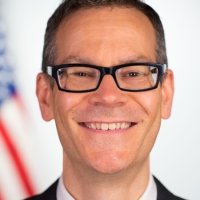Civil Strife in the Developing World: New Insights on Connections Among Environment, Demography, and Conflict
"Civil strife in the developing world represents perhaps the greatest international security challenge of the early 21st century," said Colin Kahl, University of Minnesota assistant professor, at a May 3, 2006, event co-sponsored by the Environmental Change and Security Program and the Africa Program. But what are the causes of civil strife? Drawing from his new Princeton University Press book States, Scarcity, and Civil Strife in the Developing World, Kahl—also a 2004-2005 Council on Foreign Relations International Affairs Fellow at the Department of Defense—attempted to answer this question by examining how demographic and environmental factors can create turmoil in many countries and regions, and also create threats to national security.
Pathways to Violence
Population and environmental pressures, and their effects on conflict, have garnered increasing attention in the past decade. Robert Kaplan's 1994 Atlantic Monthly article "The Coming Anarchy" singled out environment as "the core foreign-policy challenge from which most others will ultimately emanate." In 2002, then-Secretary of State Colin Powell identified sustainable development as a "security imperative"; and the 2006 National Security Strategy warns that environmental destruction may "overwhelm the capacity of local authorities to respond, and even overtax national militaries, requiring a larger international response."
Despite the growing recognition of the population-environment-conflict connection, Kahl believes most research suffers from a fundamental oversight: "Existing studies on the subject point to a number of important dynamics, but several crucial causal pathways and interactions with social and political variables are ignored." His analysis uses a causal variable, demographic and environmental stress (DES), which is a composite of rapid population growth, environmental degradation, and unequal distributions of renewable resources. By evaluating the degree to which DES affects civil strife within a particular country's social and political structures, Kahl's work attempts to fill an "explanatory gap and thereby enhance our understanding of the population-environment-civil strife connection…and take a careful look at the social and political factors that exacerbate—or mitigate—the potential for violent conflict."
A New School of Thought
Kahl's thesis—that demographic and environmental pressures can contribute to conflict in certain circumstances—is reminiscent of Thomas Malthus' 1798 treatise predicting that population growth would overwhelm food supply and engender violence. However, Kahl distanced himself from the neo-Malthusian school by identifying weaknesses in two of its theories of intra-state conflict: the deprivation hypothesis and the state failure hypothesis. The former suggests that the mixture of population growth, environmental degradation, and poor distribution of natural resources results in deprivation among the poorest elements of society, and thus increases the chances of political upheaval. But this theory, Kahl said, "overpredicts the incidence of civil strife," often because it does not acknowledge the sacrifices individuals must make—in land, wages, and time, for example—to participate in organized violence.
Although the second hypothesis—state failure—provides the foundation for Kahl's own thesis, he identifies several limitations within this model. Advanced by Thomas Homer-Dixon and Jack Goldstone, the state failure framework accepts that environmental and demographic pressures lead to conflict only in those countries with weak state governance, while strong states with the same pressures are immune to conflict. Opposing this view, Kahl argued that state strength can also provide an avenue for conflict, allowing "state elites to exploit demographic and environmental pressures to engineer violence downward toward social groups." The state failure hypothesis also assumes that DES is a universal contributor to conflict. "Civil strife can emerge in societies, such as the Balkans, where the fundamental drivers of conflict are not demographic or environmental in nature," Kahl said.
Kahl named two intervening variables—"groupness" and institutional inclusivity—that affect whether DES will push a state toward failure or exploitation: "When these pressures are refracted through certain forms of social organization and certain types of political institutions, the prospects for violent internal conflict escalate dramatically." Countries with high degrees of groupness divide easily into ethno-cultural, religious, or class factions. "These conditions encourage violence by helping overcome the collective action problems inherent in the formation of conflict groups," he claimed. On the other hand, institutional inclusivity—influence wielded by inclusive groups or organizations over the state—can reduce the chances of conflict: "Inclusive institutions check violence by facilitating societal cooperation in the face of a weakened state, while exclusive institutions short-circuit cooperation and leave state elites free to instigate violence."
Linking Civil Strife to National SecurityCivil strife has many implications for national security, according to Kahl: "Armed conflicts have crippled the prospect for a better life in many developing countries…by destroying essential infrastructure, decimating social trust, encouraging human and capital flight, exacerbating food shortages, spreading disease, and diverting precious financial resources toward military spending." Yet there is still a disconnect between in the "softer" side of conflict and those issues the U.S. government deems most critical. Residing at the top of the national security agenda since September 11, 2001, are what Kahl calls the "twin menaces posed by terrorism and weapons of mass destruction." This disconnect will not be resolved until environmental degradation and population pressures can be linked to national security, said event discussant Marvin Ott, professor of national security policy at the National War College. In the current political climate, both Ott and Kahl noted, a link to national security will open both ears and wallets. "You have to make the connection to national security," Ott said. "It may be distasteful, but if you can make it in certain instances, you can make some traction."
Capturing the ears of the intelligence and security community, Ott said, requires fewer "elaborate theories" and instead, "better sensitivity and understanding of the multiple variables at work." Additionally, the lack of data to support many of these claims is a significant barrier: "Data is very hard to come by, and there is a very large requirement for people to spend a lot of time out in the field, getting their boots muddy to try to begin to put together a data base that will be meaningful."
Data acquired on the ground has resulted in great strides in public health, family planning, and environmental sustainability, but Kahl added that interventions alone cannot resolve civil strife. "It shouldn't be your only strategy to address environmental security," he said. "Your strategy should also try to affect the incapacities, structures, and forms of organization that mediate the relationship, because there are places where you can't do enough, can't do it fast enough, and as a result, you want to be working on a lot of these things at the same time."
Implications and Lessons for the Future
Philippines, Kenya, Egypt, Indonesia, Nigeria, India, Pakistan—Kahl reeled off a list of countries that not only suffer from environmental and population pressures, but which are also key to national security because they have hosted Al Qaeda operations. But what should be done about conflicts in countries, such as the Democratic Republic of the Congo, that have no obvious link to current national security concerns? While a realist would argue the international community should adopt a "triage" strategy that avoids direct conflict intervention, and instead focuses on managing spillover or "neighborhood" effects, Kahl said, "The humanitarian in me says we should try to do some things at the margin to make a real difference in real lives of individuals."
Beyond ensuring national security and providing humanitarian aid, Kahl proposed that the United States should build governance capacities, governmental competence, political legitimacy, and a commitment to the public good in conflict-torn countries. In U.S. foreign policy, though, achieving these critical goals often takes a backseat to conventional democracy building: "When [the United States] thinks of democracy [it] thinks elections, but you can't have immediate elections in societies that are sharply cleaved along distinct lines. You need to grow civil society first, then grow responsive political parties, and then have elections."
"I think it is really important that we not blame the victim," Kahl said, noting that the problems plaguing the developing world often have roots outside these countries. Many of the remedies for environmentally related conflict propose that developing countries should be more environmentally sustainable, or lessen the burden on their resources by reducing their population growth. But as Kahl pointed out, the biggest global problem is within the developed world. "Guess who the biggest ecological footprint is? It's not Zimbabwe or Chad or Sri Lanka. It's the United States of America. We consume 50 times more resources per capita than the average Bangladeshi. And that hypocrisy matters in terms of getting others to do as we ask them to do." Kahl argued that the U.S. government must recognize this hypocrisy and act now: "We need to be more serious about this, because it's our footprint on them that is a big part of the problem."
Drafted by Alison Williams.
Speakers


Adjunct Professor, Johns Hopkins University; Former Professor of National Security Policy, National War College and Deputy Staff Director, Senate Select Committee on Intelligence
Hosted By

Environmental Change and Security Program
The Environmental Change and Security Program (ECSP) explores the connections between environmental change, health, and population dynamics and their links to conflict, human insecurity, and foreign policy. Read more


Africa Program
The Africa Program works to address the most critical issues facing Africa and US-Africa relations, build mutually beneficial US-Africa relations, and enhance knowledge and understanding about Africa in the United States. The Program achieves its mission through in-depth research and analyses, public discussion, working groups, and briefings that bring together policymakers, practitioners, and subject matter experts to analyze and offer practical options for tackling key challenges in Africa and in US-Africa relations. Read more


Maternal Health Initiative
Despite global attention and calls to action, women continue to die while giving birth. The Maternal Health Initiative (MHI) leads the Wilson Center’s work on maternal health, global health equity, and gender equality. MHI works to connect issues critical to global health and women’s empowerment to foreign policy and US leadership, with a focus on improving the lives of women, adolescents, and children around the world. Through collaborations with policymakers, academia, donors, and practitioners, MHI produces cutting-edge research, fosters cross-sectoral engagement, increases awareness of key issues, and informs US leadership on solutions for ending maternal and newborn deaths and addressing gender-based global health issues. Read more
